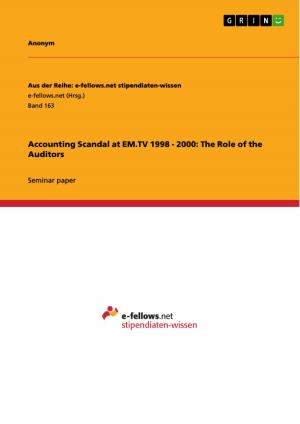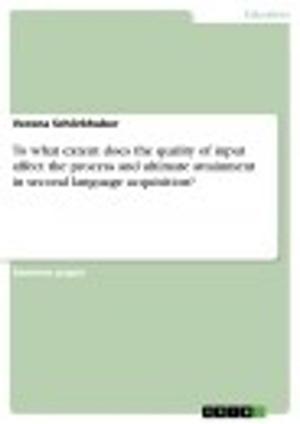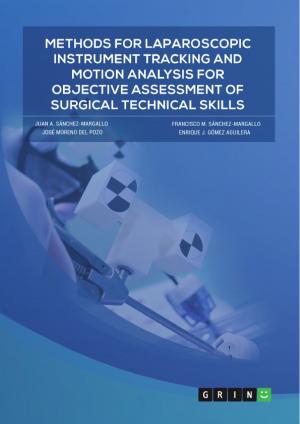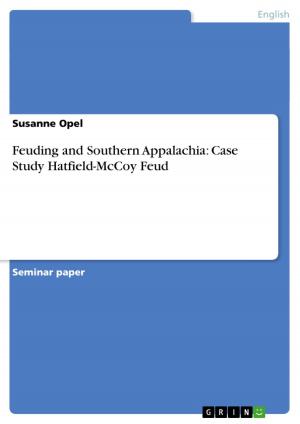| Author: | Stefan Detscher | ISBN: | 9783638273152 |
| Publisher: | GRIN Publishing | Publication: | May 2, 2004 |
| Imprint: | GRIN Publishing | Language: | English |
| Author: | Stefan Detscher |
| ISBN: | 9783638273152 |
| Publisher: | GRIN Publishing |
| Publication: | May 2, 2004 |
| Imprint: | GRIN Publishing |
| Language: | English |
Research Paper (undergraduate) from the year 2003 in the subject Business economics - Investment and Finance, grade: 2,0 (B), European Business School - International University Schloß Reichartshausen Oestrich-Winkel (Corporate Finance and Capital Markets), language: English, abstract: This book examines the links between corporate finance and the theory of the firm. As a basis for this analysis, theoretical foundations in corporate finance and the theory of the firm are provided. Furthermore, current research on the theory of the firm and corporate finance for the recently emerged type of firm of the human-capital intensive firm is presented. The most significant part of the analysis is the evaluation of the interrelation between corporate finance and the theory of the firm using a 3x3 matrix. This matrix compares three important theoretical frameworks of the firm (the firm as a nexus of contracts, as a collection of growth options and as a collection of assets) with three major fields of corporate finance (capital structure, corporate governance and valuation). This assessment is done for the traditional asset-intensive industrial firm, one of two basic types of firms in today's economy. For giving an additional insight into current research, the recently emerged human-capital intensive firm is shortly described in comparison to the traditional asset-intensive firm, and implications for corporate finance for this new type of firm are explained. As a conclusion, three major results can be stated: firstly, the theory of the firm definitely influences corporate finance for all described views of the firm, and it is thus an important basis for corporate finance. This fact makes it necessary to consider the underlying issue of the theory of the firm for each problem in corporate finance. Secondly, different views of the theory of the firm have different implications for corporate finance. For example, the appropriate valuation method depends on the considered view of the firm. A third result being observed is that corporate finance and the theory of the firm are in an ongoing change. An example of this is the emergence of human-capital intensive firms within the last decade.
Research Paper (undergraduate) from the year 2003 in the subject Business economics - Investment and Finance, grade: 2,0 (B), European Business School - International University Schloß Reichartshausen Oestrich-Winkel (Corporate Finance and Capital Markets), language: English, abstract: This book examines the links between corporate finance and the theory of the firm. As a basis for this analysis, theoretical foundations in corporate finance and the theory of the firm are provided. Furthermore, current research on the theory of the firm and corporate finance for the recently emerged type of firm of the human-capital intensive firm is presented. The most significant part of the analysis is the evaluation of the interrelation between corporate finance and the theory of the firm using a 3x3 matrix. This matrix compares three important theoretical frameworks of the firm (the firm as a nexus of contracts, as a collection of growth options and as a collection of assets) with three major fields of corporate finance (capital structure, corporate governance and valuation). This assessment is done for the traditional asset-intensive industrial firm, one of two basic types of firms in today's economy. For giving an additional insight into current research, the recently emerged human-capital intensive firm is shortly described in comparison to the traditional asset-intensive firm, and implications for corporate finance for this new type of firm are explained. As a conclusion, three major results can be stated: firstly, the theory of the firm definitely influences corporate finance for all described views of the firm, and it is thus an important basis for corporate finance. This fact makes it necessary to consider the underlying issue of the theory of the firm for each problem in corporate finance. Secondly, different views of the theory of the firm have different implications for corporate finance. For example, the appropriate valuation method depends on the considered view of the firm. A third result being observed is that corporate finance and the theory of the firm are in an ongoing change. An example of this is the emergence of human-capital intensive firms within the last decade.















